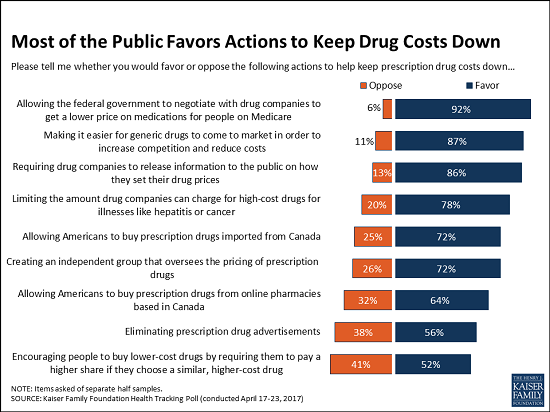Klobuchar, McCain, and
Grassley have worked together on bipartisan legislation that would address
skyrocketing prescription drug prices, including bills to allow for personal
importation of medications from Canada and bills that would deter pharmaceutical
companies from blocking cheaper generic alternatives from entering the
marketplace
WASHINGTON, D.C. – U.S. Senators Amy
Klobuchar (D-MN), John McCain (R-AZ), and Chuck Grassley (R-IA) have urged
Office of Management (OMB) Director Mick Mulvaney to use existing executive
authority to bring down prescription drug costs, including by certifying
importation of prescription drugs from Canada. According to media reports,
Mulvaney said last week that he has been actively discussing potential
executive or administrative solutions with the President to address rising
prescription drug costs. Additionally, Health and Human Services Secretary Tom
Price has been holding “listening sessions” to discuss possible solutions.
Klobuchar, McCain, and Grassley have
also worked together on bipartisan legislation that would address skyrocketing
drug prices, including bills to allow for personal importation of medications
from Canada, where drug prices are, on average, half the cost they are in the
United States, and bills that would deter pharmaceutical companies from
blocking generic alternatives from entering the marketplace. In their letter,
Klobuchar, McCain, and Grassley detail how the Administration could use
executive or administrative action to reduce the ever-increasing financial
burden of prescription drugs for millions of Americans.
“According to media reports, you
said on Thursday that you have been actively discussing potential executive or
administrative solutions with the President to address rising prescription drug
costs. Similarly, Secretary Price has been holding ‘listening sessions’ to
discuss possible solutions. We write to express our support for such efforts
that could provide immediate relief to Americans,” the senators wrote. “Consistent
with your comments last week, the Administration has an opportunity to use
existing statutory authority to quickly restore competition to the market with
the introduction of cheaper, imported alternatives.”
The senators continued, “We urge you
to seriously consider this existing statutory authority as well as explore
other options for executive action. We also ask that you please provide your
recommendations as to what additional authority you would require to protect
American consumers. Of course, we would welcome your support of our legislation
to bring down the costs of prescription drugs as well.”
Klobuchar and McCain introduced the Safe
and Affordable Drugs from Canada Act to require the Food and Drug
Administration to establish a personal importation program that would allow
individuals to import a 90-day supply of prescription drugs from an approved
Canadian pharmacy. The bipartisan Preserve Access to Affordable Generics Act
Klobuchar and Grassley introduced would crack down on anti-competitive
“pay-for-delay” deals in which branded companies pay their generic competitors
not to compete as part of a patent settlement. These pay-for-delay agreements
delay consumer access to generic drugs, which can be as much as 90 percent
cheaper than brand-name drugs. The legislation would help make sure consumers
have access to the cost saving generics they need by stopping these
anti-competitive pay-off agreements that keep more affordable generic
equivalents off the market. In addition, Klobuchar and Grassley introduced the Creating
and Restoring Equal Access to Equivalent Samples (CREATES) Act with
Senators Patrick Leahy (D-VT), Dianne Feinstein (D-CA), and Mike Lee (R-UT).
The CREATES Act would combat anticompetitive practices used by some
brand-name pharmaceutical and biologic companies to block or delay entry of
lower-cost generic drugs in the marketplace.
The full text of the senators’
letter is below.
Dear Director Mulvaney:
According to media reports, you said
on Thursday that you have been actively discussing potential executive or
administrative solutions with the President to address rising prescription drug
costs. Similarly, Secretary Price has been holding “listening sessions” to
discuss possible solutions. We write to express our support for such efforts
that could provide immediate relief to Americans.
We have worked together on
bipartisan legislation that would address skyrocketing drug prices, including
bills to allow for personal importation of medications from Canada, where drug
prices are, on average, half the cost they are in the United States, and bills
that would deter pharmaceutical companies from blocking cheaper generic
alternatives from entering the marketplace.
While we pursue these legislative
options in Congress, we strongly encourage you to take executive or
administrative action to reduce the ever-increasing financial burden of
prescription drugs for millions of Americans. We have previously outlined ways
that the Administration could implement such strategies in a targeted manner
that satisfies rigorous safety standards.
Specifically, we wrote to Secretary
Price in February urging him to utilize authority the Administration already
has under law. Our letter highlighted that Congress enacted legislation in 2003
that would enable importation of less costly medications from abroad. Under
this law, the Food and Drug Administration (FDA) can permit pharmacists and
wholesale retailers to import prescription drugs from Canada. Additionally, the
FDA can issue a waiver to allow individuals to import prescription drugs for
personal use. However, this law stipulates that the provisions related to
importation do not become effective until the Secretary of Health and Human
Services certifies that the implementation of importation would pose no
additional risk to the public's health and safety and would result in a
significant reduction in the cost of covered products to the American consumer.
Consistent with your comments last
week, the Administration has an opportunity to use existing statutory authority
to quickly restore competition to the market with the introduction of cheaper,
imported alternatives. Under the statute, the Secretary has the authority to
issue the certification in a targeted manner to address the current market conditions
in a way that readily meets safety standards. The policy can also be expressly
limited so that it does not negatively affect innovator companies that invested
in the development of the drug.
We urge you to work with Secretary
Price to immediately begin considering certifying importation of prescription
drugs from Canada in the following circumstances:
1.
The drug is off patent
or no longer marketed in the United States by the innovator company that
initially developed the drug;
2.
In cases where there are
significant and unexplained increases in price;
3.
No direct competitor
drug is currently in the market and introduction of a competitor drug will
benefit the prices paid by taxpayers and consumers; or
4.
The drug is produced in
another country by the name brad manufacturer that initially developed the drug
or by a well-known generic manufacturer that commonly sells pharmaceutical
products in the United States.
We urge you to seriously consider
this existing statutory authority as well as explore other options for
executive action. We also ask that you please provide your recommendations as
to what additional authority you would require to protect American consumers.
Of course, we would welcome your support of our legislation to bring down the
costs of prescription drugs as well.
We look forward to your timely
response to this request.




